After 24 hours on trains, we were so happy to be on the road again. Our plan was to bike to Moynak, a town that used to be on the edge of the Aral Sea, visit the sea, and then follow the Amu Darya River upstream. From the Kungrad train station, we biked a couple of hours before making camp behind a slight rise near the road, had our usual pasta dinner, and turned in. The next day we continued to Moynak. We were surprised at the amount of green as we biked, made possible by irrigation canals off the Amu Darya and a high water table. There was less and less green as we traveled north, though, and as we neared Moynak it was a fairly desolate brown-gray in all directions. We also saw what we thought were dust storms, but was mostly smoke from burning the little plant life that grows around town in order to create better pasture.
From what we had read, we expected a totally bleak, lifeless ghost town to greet us. We were surprised when we stopped to buy a drink near the bus station on the outskirts of town, to find a reasonable amount of activity – women and children waiting for martrushkas (small buses) into and out of town, a few stalls selling snacks, and a couple of small shops and cafes. Not exactly hopping, but not dead either. We found the one hotel in town and met Lhamo, another traveler our guide had found who joined us for our tour to the Aral Sea, bringing down the cost and adding a fun new dynamic to our traveling team.
We loved visiting the Aral Sea, even though we know it is the site of one of the world’s worst environmental tragedies. To see more about this trip, see this blog post.
After our two-day jeep trip to the Aral Sea, the driver dropped us off in Nukus, the capital of the province and autonomous republic of Karakalpakstan (Karakalpakstan has its own language – Karakalpak – which is closely related to Uzbek and Kazakh. Schools are taught in this language, and no one we talked to suggested there was tension around this different ethnic group and language, unlike what we encountered in Kurdistan). We had planned to start biking towards Khiva that evening, but I remembered that we had a contact for our project in Nukus. We checked our email, and our contact had responded to our earlier message with a phone number. We called, and half an hour later he was sitting with us in the cafe of the hotel where we’d been dropped off, telling us about his work on water management in Karakalpakstan. Check back soon for a post on water management in Karakalpakstan and the nearby district of Khorezm.
From Nukus, our plan was to bike southeast through Uzbekistan, visiting Khiva and Bukhara, and maybe Samarkand and Tashkent if we had the time. I was feeling giddy as we set out in the morning, happy to be back on the bike and making forward progress. We stopped for lunch at a small chaihanna (spellings for this word, which means tea house, change from region to region, so I’m just going with the most phonetic English spelling) – the family that ran it was sweet and got out their cellphones to take pictures with us. Unfortunately, I think their food may have been less than fresh; the electricity was out (a common enough thing, but maybe in this case it had been out for awhile…), and everything was room temperature. We made it to a small village around sunset and asked around for a place to camp. At a tiny shop, a young man beckoned for us to follow him; he led us to his family’s house, where we were allowed to set up our tent in the backyard. It was a nice combination of privacy and socializing, as we made our own dinner but were then invited into their beautiful home to eat while they had tea. A neighbor who spoke English came by, and David interviewed the father about climate change with his help. As I ate, I started feeling peculiar; I got very hot, and my stomach felt unsettled…
I got in the tent feeling decidedly queasy; I hoped the fresh air through the tent screen and a good night’s sleep would help, but I had barely drifted to sleep when I woke up fighting waves of nausea. I unzipped the tent, wondering if I could navigate the path past the chickens and cows to the outhouse in the dark, and then it passed. I went back to a fitful sleep, only to be woken up by more insistent messages from my stomach. Sitting up to open the tent made it worse, so I worked the zippers with my toes. Something was definitely wrong. I fell out of the tent and managed to crawl a few feet to a nearby canal just in time… very unpleasant, but I felt better and was able to sleep after emptying my stomach of whatever vile thing I’d eaten that caused the problem.
The next morning I felt weak and couldn’t eat anything, but for some reason I thought I could bike the 70 km to Khiva where I could just rest in an air-conditioned guesthouse and then see the ancient Silk Road city I’d read about. It didn’t quite go like that. I was a little worried that leaning over my bike would hurt my stomach, but the real problem was that I had no strength; I had nothing in my system and I was bearing all my weight on my arms to spare my stomach the jolts from the bumpy road. Even with David carrying all of my gear (thanks, David!) I was riding at a snail’s pace. I broke the ride down into 12-km segments; after the first 12, I found a slab of concrete outside an empty-looking building and threw myself to the ground. I was asleep by the time David got off his bike.
It went on like this for several hours, and it got hotter and hotter – David was pouring water over me to help cool me down, but it dried quickly in the 105-degree furnace-blast headwind that was central Uzbekistan in the middle of July, and we stopped every few kilometers to repeat the process. Eventually we limped into a small shop to buy water; we poured ourselves onto the floor and sipped languidly at our drinks while the shop owners looked on in mild alarm. We chatted with them a bit, and they brought over a chair for me to sit in. Another customer invited us to nap in his house, but we waved him off, saying we had to make it to Khiva. After he left, and we still hadn’t budged, the shop owner’s son tried again. ‘Dom?’ he said, folding his hands under his tilted head in the the universal sign for sleep. ‘Khiva!’ David said, still a motionless puddle on the floor in the corner. Realizing that I had nearly fallen asleep as this conversation unfolded, I reasoned that we were actually more likely to make the remaining 25 km to Khiva if we rested for an hour or so and continued on when it was cooler. My brilliant argument won, and we followed the young man to his house, conveniently right next door. We collapsed on mats on the floor in the main room, and woke up two hours later. I felt marginally better and thought we really might make it to Khiva – until David spoke up and told me he wasn’t feeling very well.
The mother came in with tea and cookies and made motions and words that I think meant we could sleep there that night. ‘Khiva…’ I weakly said in response. As the afternoon wore on and neither of us felt compelled to stand up, we realized we needed to stay. I mimed our inability to bike to the son and said ‘palatka?’ (tent), gesturing outside, to ask if we could camp near their house. He shook his head and pointed to the mats we were lying on – ‘You’ll spend the night right there,’ he was clearly saying. So we did. Around 9:00 they served dinner, and this was when I realized David really wasn’t doing well. ‘You go,’ he said. ‘I don’t think I can eat.’ I wasn’t sure that I could eat, either, but I managed half a bowl of soup and a few pieces of fried potatoes. During dinner, I had a nice conversation with the ten-year-old granddaughter of the family, using her book from English class at school. I was re-learning the Cyrillic alphabet when a family member came in and said something that caused a stir. I didn’t understand until they said ‘temperatura’ and wrote down 38.7. This meant nothing to me, but we did the math and realized David had a temperature of 102. I wasn’t sure what to do, but fortunately it wasn’t left up to me. Within 15 minutes, an old man and young woman burst through the doors, wearing scrubs and carrying a metal case. The man sat down next to David and started taking his vitals. He spoke about six words in English and the rest of the time he just yelled jovially in Russian. He established David’s age, took his blood pressure and temperature, prodded his stomach (ouch) and then indicated that David needed an injection. Oh boy. I wrote down the medicines but don’t actually know what they were. We figured it probably wouldn’t do any damage so motioned to go ahead. As they were leaving, we asked how much we owed and were waved off. We’re not sure if it’s a socialized medical system or the fact that the father is a doctor. In any case, I couldn’t believe our good fortune in having ended up there. After that, we slept some more and David’s temperature went down. The next morning we both felt well enough to eat breakfast and interview the mother about climate change.
It was getting late and if we were going to bike to Khiva in the cooler part of the day we needed to leave. ‘Don’t go!’ they said; ‘Stay, and we’ll make you plov!’ Plov – the national dish made of rice with carrots and meat – is generally tasty, but it may have been what made us sick and it was the last thing we wanted at that particular time. I was still eager to get to Khiva, so we thanked them again and biked the last bit to Khiva, though we felt sad about it as soon as we left – they were a lovely family and really helped us when we needed it, and it would have been nice to spend more time with them. However, the riding was great – it was the easiest 20 km I’ve ever biked. Flat, cool, with a tail wind. We found ourselves outside the huge mud walls of Khiva in one hour and four minutes.
We found a guesthouse and set out to find the touristy, edible food we’d dreamed of. Turns out that Khiva, while an obvious tourist attraction, is not fully a tourist town. Everywhere we went had only national dishes (plov, manty (meat dumplings), pungent green noodles made with dill) on their menus, and half of the listed dishes weren’t available. We finally settled on potato ravioli. Starch wrapped in starch! That went down OK, and then I asked the waitress if there was a salon in town where I could cut my hair. She showed me to one, where I proceeded to get the worst haircut of my life – she chopped off about ten inches, which was a few more than I wanted, and it was so uneven that I needed to do touchup with a pocketknife later. Still, I feel it was worth the ten dollars I paid (I was later told I was totally cheated, but it’s the cheapest haircut I’ve ever gotten), and it’s much cooler for the Uzbek summer and easier to deal with in cold, no-pressure showers. David also got some grooming done (they did a better job with him).
We enjoyed a couple of days exploring the tiny, walled-in ‘museum city’ – so many mosques and medrassas – all exquisite, tiled affairs with little museums tucked into random corners. We visited as many as we could before they started to all look alike, and then spent a lovely evening watching the sunset from the watchtower in the Ark – the Khan’s residence back in the day. In addition to the view of the city skyline, we had the distinct pleasure of watching a group of young men film a music video. One guy pretended to play the guitar and dramatically lip synced a song about Uzbekistan while the others ran around him with huge cameras to capture him from every angle. A group of Spanish tourists – almost the only other foreigners in the city – had also come up for sunset, and it was nice to be able to speak Spanish after months of trying to communicate in languages we don’t actually speak.
We stayed an extra day in Khiva since David still wasn’t 100%, and then we biked the 35 km to Urgench where we had set up a meeting with an agricultural economist who works on water and land management in Khorezm, the district around Khiva. We met over lunch – plov again, but this time hot and delicious – in her home, but no sooner had David taken a few bites than he started feeling sick again. We ended up staying two nights in Urgench for him to recover, and I admit I may not have been the most compassionate traveling companion. I tried to take care of him and not be too impatient, but at this point I was feeling stuck in the middle of the country with just over a week until our visa would run out. Even if we were healthy we couldn’t bike the whole thing, and I felt stressed about the road ahead – 400 km of desert to Bukhara, then another 500 to the border. We hadn’t decided whether to visit Tashkent and meet with experts there, and Samarkand had been recommended by everybody but since the border crossing near it was closed, it would be a big detour. We were also concerned about the border itself, since we hadn’t declared everything on the train (it was very confusing at four AM… ) and we’d heard stories of very thorough searches.
In the end, we biked 80 km out of Urgench until the green, irrigated landscape ended and we were in desert again, then hitched a ride with two Russian truck drivers to Bukhara. It took nine hours and every once in a while they would say ‘police’ and close the curtain that divided the bed in the back of the cab, where we were sitting, from the front. There were never any problems though, and in the evening they stopped and fixed us a little picnic dinner. Very nice guys – one had been driving for 35 years – and we wish we spoke enough Russian to have real conversations with them! They dropped us off at a truck stop a few kilometers outside of the city, and we biked in around midnight. It was a nice time to arrive, as it was quiet and cool, but a few people – including a few friendly guys on bikes who joined us for the last stretch – were still up, and a nice, not-too-aggressive guesthouse owner found us on the street and offered us a decent room for $20. We decided to stay there rather than wandering around any longer, and we spent the next day exploring the city.
Bukhara is much more ‘lived-in’ than Khiva and feels a bit more real. The ancient buildings are more spread out and it isn’t completely walled in. First order of business was to get more money, as we were nearly out (tip: there is an ATM that dispenses dollars! It’s near the bazaar on the way from Lyab-i Hauz to the main complex. I was convinced we were out of luck since it was Sunday, the next day was a holiday, and our outdated guidebook said most ATMs didn’t work or would give a terrible exchange rate. When we found it, managed to punch the right buttons in Russian, and Benjamins rolled out, I confess I nearly cried. Uzbekistan was getting to me…); we also needed some tubes since we had no spares after I got a flat on the way to Moynak. Between the errands and an afternoon nap, I’m sure we missed some things in the guidebooks, but we were content visiting a few major mosques, minarets, and medrassas, as well as doing our first souvenir shopping since Diyarbakir. We wandered between the covered bazaar areas, the Lyab-i Hauz (old pool surrounded by cafes and mulberry trees), and Bukhara’s main complex, and when it got cool in the evening enjoyed watching kids ride their bikes and kick a soccer ball around the ancient plaza in front of the main mosque. It was the last night of Ramadan and there was a festive feeling that evening, with families out and about until late.
We got up the next morning and finally started riding towards the Tajikistan border. We’d decided to skip Tashkent and Samarkand since we wouldn’t be able to reach them by bike and really only had time to get out of the country. It took five days to get to the border, riding from about six to noon, napping in chaihannas from noon to four, and then riding until sunset. The first night, we camped in the yard of a big restaurant, and the next night by a small river after biking out of the flat desert and into our first bit of topography (yay!). The following night we treated ourselves to a cheap hotel in the friendly town of Boysun, a bright oasis in a basin between dusty mountains. The roads at this point were lined with girls and women selling apples and grapes – a nice contrast to the ubiquitous melon-selling men that had lined the road since Nukus. There was something comforting about biking up tree-lined hills with smiling, salam’ing girls after the rest of Uzbekistan which was, for the most part, monotonously flat and deserty. There were still checkpoints, but instead of looking at our passports the police usually just gave us melon and asked questions about our bikes and other gear (everybody is fascinated by the rearview mirror on David’s helmet). We also bumped into our first cycle tourists since Georgia – a Korean couple one year and four months into their three-year around-the-world trip. They gave us good tips about the road ahead and got us excited for the Pamirs.
The following day we made it to Denau, the last town before the border. It was too populous to sneak off the road and camp, so we started asking for a place to put our tent. Before we knew it we were surrounded by men, all insisting we come to their house. One called an English-speaking niece – what a relief to hear her say ‘wait ten minutes, I will come for you – I have a big house and you will stay there.’ However, her uncle didn’t stick around to tell everybody what was going on, so we spent those 10 minutes trying to politely explain in our miserable Uzbek/Russian that they were very kind but we already had an invitation to somebody’s house and she will be here soon, we must wait, etc. When she did get there we were being forcibly marched to somebody’s house; we were very happy to follow her to her home, where the family had a mini-party for us and she translated and talked about her life all evening. She had learned English in Dubai, where she’d lived for eight years. Now she wanted to move to the US, or anywhere really other than the small town where her family lived. It was wonderful being able to learn about Uzbekistan from a peer (well, she’s 26), and her family was very kind to us. It was sad, though, hearing about her frustrations with the lack of opportunity she faced.
We left late the next morning for the final stretch to the border. To our delight, we were not searched – our bags were put through an x-ray machine, our medicines received a cursory examination (perhaps cut short because something had leaked and the bag was sticky, making it unpleasant to search), David was asked to explain only 1 piece of recording equipment, and the harshest line of questioning was why we don’t have children. Whew! We were delighted to have made it through after a lot of worrying, and we received a friendly welcome from the Tajik guards as well.
Oh, Uzbekistan – your heat, police presence, and stomach ailments tested us, but we had a lovely last week there and I’m glad we biked the final stretch. I have yet to process the images of never-ending desert from the train (big props to people who bike that northern stretch!); the Amu Darya abruptly ending in the middle of the desert; the Aral Sea and the people who live on its former shore; endless flooded cotton fields; water flowing everywhere, in canals, backyards, and roadsides; the occasional camel on the side of the road (or the middle of it); towering tiled minarets and ancient medrassas; lonely towns in the middle of dusty mountains where old men wave us over for chai and then perform a prayer for our onward journey; green oasis gems with apples and commerce and cheerful women; and of course the families who took care of us when we were sick and told us about their lives. Part of me wishes we could have covered more ground, but being sick forced us to slow down and perhaps experience more even while seeing less.
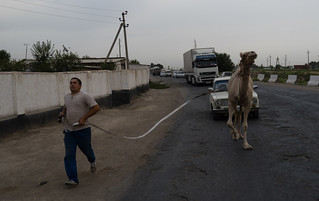
We are now in Dushanbe, the capital of Tajikistan, preparing for the Pamirs and plotting the second half of our trip. India, China, Tibet, Nepal… The borders and restrictions that plague this part of the world are getting us down, but I know our frustration is trivial compared to how all of this affects the lives of people who actually live here. We have lots of exciting route options – we just need to pick one, make sure our visas are in order, and start moving.







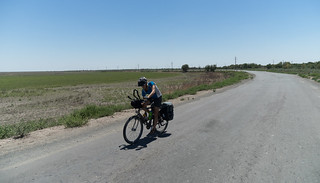
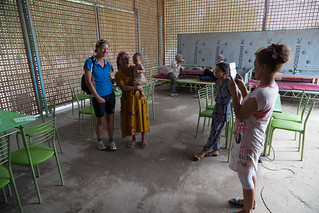
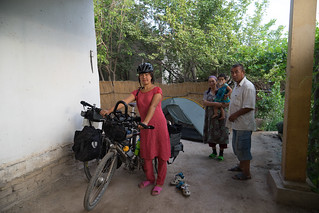
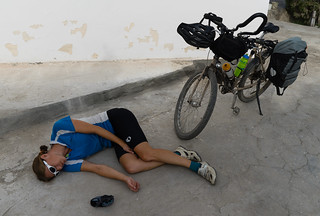
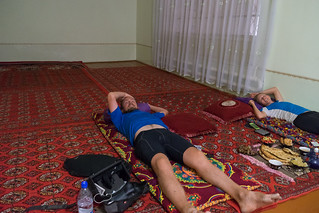
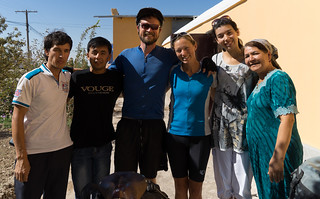
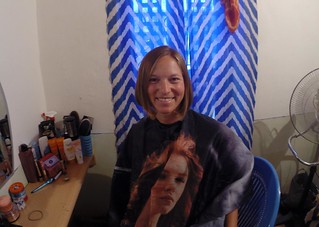
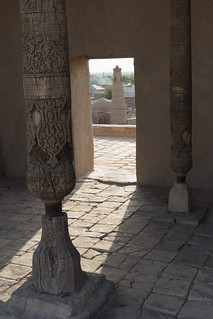
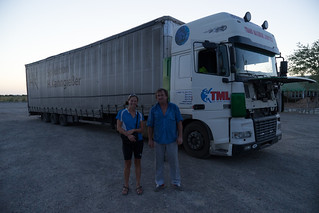
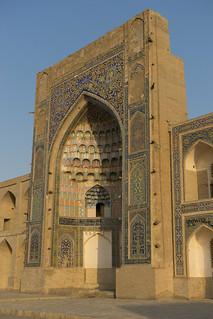
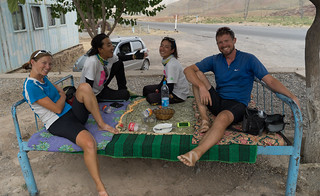

So cool to hear about a country I know nothing about. And I’m inspired by the Korean couple taking 3 years to bike the world. My husband and I are taking a year to bike some of europe and asia starting in June 2015, but 3 years?!